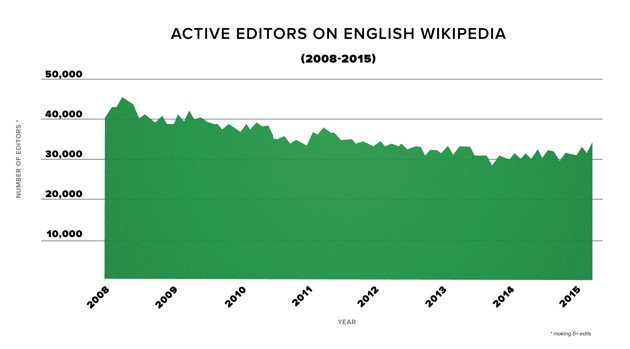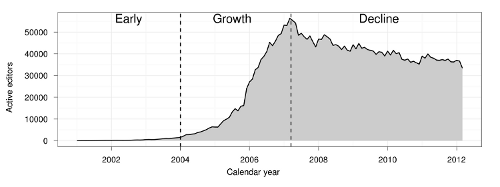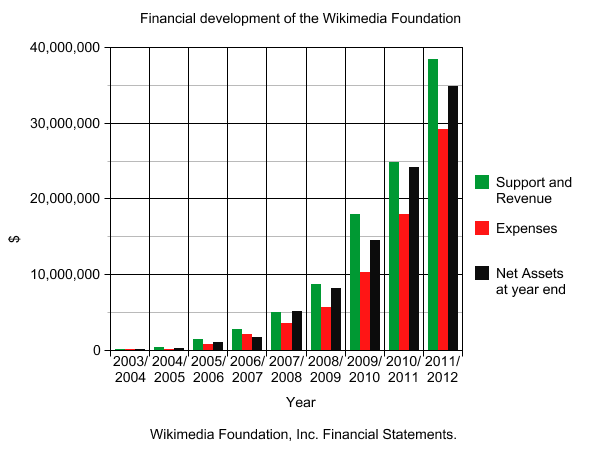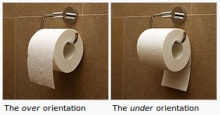Difference between revisions of "Wikipedia/Problems"
m (Text replacement - "know hoe" to "know how") |
(implies) |
||
| Line 37: | Line 37: | ||
====Notability==== | ====Notability==== | ||
{{FA|Wikipedia/Notability}} | {{FA|Wikipedia/Notability}} | ||
| − | Notability "is a test used by editors to decide whether a topic can have its own article"<ref>[http://en.wikipedia.org/wiki/Wikipedia:Notability Wikipedia's 'Notability'] guideline</ref>. The primary criterion used by Wikipiedia to determine notability is that a subject has ''"gained sufficiently significant attention by the world at large and over a period of time... from reliable independent sources"''. By excluding individual researchers (no oversight | + | Notability "is a test used by editors to decide whether a topic can have its own article"<ref>[http://en.wikipedia.org/wiki/Wikipedia:Notability Wikipedia's 'Notability'] guideline</ref>. The primary criterion used by Wikipiedia to determine notability is that a subject has ''"gained sufficiently significant attention by the world at large and over a period of time... from reliable independent sources"''. By excluding individual researchers (no oversight <big>⇒</big> questionable by definition), this cedes de facto control of topics to {{ccm}}. This policy means that Wikipedia, although created mainly by volunteers, amplifies the power of those who have editorial control over television and other {{ccm}} - those which they do not report on are excluded from Wikipedia. Governments seek to manipulate the "notability" of topics of particular interest to them.<ref>http://www.rt.com/uk/178652-internet-censorship-police-uk/ </ref> |
==Symptoms== | ==Symptoms== | ||
Revision as of 15:24, 7 October 2016
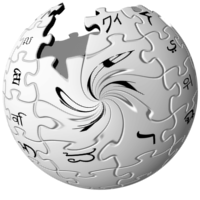 | |
| Interest of | • Markus Fiedler • Dirk Pohlmann • Swiss Policy Research • Wikipediocracy |
| An analysis of Wikipedia's problems, which suggests that its failure to challenge the establishment is rooted in its subservience to organised money-power and is the fatal flaw from which a host of other symptoms arise. | |
Wikipedia is a hugely important reference worth consulting on almost any subject where introductory knowledge is being sought. Even in the WikiSpooks domain of deep politics, Wikipedia articles can prove a valuable source of information and links, if you know how to read them. However, Wikipedia has a fundamental flaw...
Contents
The Core Problem
In 2013 Jimmy Wales stated that "the biggest issue is editor diversity".[1] It is WikiSpooks' contention that this may be just a symptom of Wikipedia's establishment-friendly policies. Their policies about what constitute "notability" and "reliable sources" effectively muzzle Wikipedia's ability to speak truth to power and effectively enforce the pro-establishment monoculture. Specifically:
Certain truths are unwelcome to the the powers that be - i.e. those that contradict the official narrative of the existing power structures. The more unwelcome such truths, the more Wikipedia articles pertaining to them will tend to be compromised by agents of those structures. For the most threatening topics, Wikipedia's "reliable sources" policy pretty much guarantees that the compromise will be fundamental.
Wikipedia's articles on MKULTRA, for example, although appearing decidedly establishment-unfriendly at first, owe much of their shock-power to the exposure of the program in the early 1970's by both the Congressional (The Church Committee) and Presidential investigations - plus the 1977 release of much previously classified material - all of which nudge Wikipedia's 'Neutral Point of View' a little closer to the truth of the matter. However, in light of subsequent understanding of how equivalent programs continue in an even more shocking and extreme form, the Wikipedia articles in fact represent what is known as a Limited Hangout (i.e. an exercise in damage limitation by the revelation of a subset of damaging information to obscure more damaging information). The Wikipedia pages on current activities that threaten established power, even of topics which are fairly widely understood, can be even more misleading since relevant material remains classified and The establishment Official Narratives continue to exert tight control on contemporary reporting about them by the commercially-controlled media.
Professionalisation
One of the hallmarks of Wikipedia's early approach was Wikipedia's reliance on independent volunteers - in contrast to the approach taken by the unsuccessful Nupedia internet encyclopedia. This cadre of volunteer editors has been in decline since 2007, more or less the same time that Wikipedia's increasing popularity and success brought it to the serious attention of professionals such as PR companies. Around this time, Wikipedia was professionalized - the Wikimedia staff increased over 2500% from 2006 to 2011 while its budget increased even more. The Register stated that Wikipedia's "aggressive annual fundraising drives have been phenomenally successful, transforming the organisation and creating a powerful new political lobbying force"[2].
Nowadays, Wikipedia is backed by 6 and 7 figure donations from companies and tax exempt foundations such as the Ford Foundation and Omidyar Network, some of which have been linked to seats on the board of the Wikimedia foundation[2]. Policies on what content is acceptable have been tightened, effectively assimilating it into the commercially-controlled media and codifying as 'third rail' topics those which the powers that be percive as threatening to the positions of power and thus ensuring that Wikipedia cannot seriously address them.
Whether obviously, - such as inclusion of advertisements on the site - or more subtly - such as the shady business of paid edits - the ongoing professionalisation of Wikipedia assists those with money to shape the content of Wikipedia. WikiScanner has shown that companies, non profits and government departments such as the CIA and PR firms, systematically edit pages of particular interest. It would be naive to expect the 2014 self-disclosure requirement about paid edits to make any serious change. Underneath the "the free encyclopedia that anyone can edit" tagline, Wikipedia's professionalisation has resulted in an institutional structure which is increasingly parallels other commercially-controlled media.
In March 2014, Wikipediocracy reported that 166 named donors to Wikipedia gave over $5,000. It reports that "we’re finding that a substantial percentage of heavy-duty donors to the Wikimedia Foundation have themselves constructed the Wikipedia article(s) germane to them. While a few have adequately disclosed their conflict of interest, most have not".[3]
Reliability
Wikipedia explicitly seeks to exclude opinions which are free from hierarchical control; its guidelines on reliability state that "The proper uses of a questionable source are very limited" which sounds reasonable until we note the definition of a 'questionable source'- "those with a poor reputation for checking the facts, or with no editorial oversight." At a stroke, individuals are out, organisations are in, especially those which promulgate the official narrative.
Blogs, say the reliability guidelines, "may be acceptable as sources so long as the writers are professional journalists or are professionals in the field on which they write and the blog is subject to the news outlet's full editorial control." [4]
So, Wikipedia's definition of reliable sources means that anyone who is wealthy or influential enough to communicate their message through the commercially-controlled media may ipso facto also tell their story on Wikipedia. Those who have less influence over big media have correspondingly less influence over Wikipedia.
The claim that the "wisdom of crowds" ensures accuracy is far from proven.[5]
Notability
- Full article:
 Wikipedia/Notability
Wikipedia/Notability
- Full article:
Notability "is a test used by editors to decide whether a topic can have its own article"[6]. The primary criterion used by Wikipiedia to determine notability is that a subject has "gained sufficiently significant attention by the world at large and over a period of time... from reliable independent sources". By excluding individual researchers (no oversight ⇒ questionable by definition), this cedes de facto control of topics to commercially-controlled media. This policy means that Wikipedia, although created mainly by volunteers, amplifies the power of those who have editorial control over television and other commercially-controlled media - those which they do not report on are excluded from Wikipedia. Governments seek to manipulate the "notability" of topics of particular interest to them.[7]
Symptoms
The closer topics come to a 'third rail issue', the more pronounced the departures from Wikipedia's higher ambitions. They include:
| Wikipedia's Problems: |
 Bias Bias
|
 Censorship Censorship
|
 Gaps Gaps
|
 Spin Spin
|
 Obfuscation Obfuscation
|
Bias
- Full article: Wikipedia/Bias
- Full article: Wikipedia/Bias
Wikipedia has a persistant "skew toward technical, Western, and male-dominated subject matter."[1] Whilst this problem may correct itself if patterns of computer use continue to stabilize globally and support for minority languages continues to improve, Wikipedia's decision to align itelf (by its professionalisation) with the powers that be presents a more fundamental problem of bias. Large organisations and companies with public relations and advertising budgets cannot be expected to refrain from seeking to hire Wikipedia editors to minimize or erase evidence of malfeasance and to show their products and services in the best possible light. Does Wikipedia really need over 4000 words on Playstation 3 Accessories, with less than half that number on the House Select Committee on Assassinations, the US government committee which concluded that there was a "high probability" that John F. Kennedy was killed as a result of a conspiracy?
Censorship
- Full article: Wikipedia/Censorship
- Full article: Wikipedia/Censorship
While some gaps in Wikipedia represent a mere failure to input information - echoing gaps in the public record, others result from active censorship. Wikipedia's system of page protection (i.e. actual prevention of edits) is usually dispensed only to the most sensitive issues, but many page histories show an active policy of censorship. Wikipedia's "notability" guidelines effectively mean that anyone (such as Kevin Annett) who has been blacklisted by commercially-controlled media will be therefore deemed "non-notable" and is subject to automatic removal from Wikipedia as a result.
Gaps
- Full article: Wikipedia/Gaps
- Full article: Wikipedia/Gaps
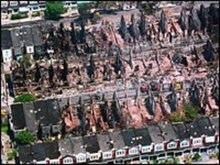
Adherence to the notability policy outlined above means that, since commercially controlled media has gaps in its output, so Wikipedia more or less omits certain topics and ideas. English Wikipedia editors do not deem the collapse of the 3 World Trade Center towers notable enough to justify their own articles, notwithstanding the fact that no steel reinforced concrete buildings have collapsed due to fire before or since.
As of January 2014, all three WTC collapses share a single article of just 7125 words - compared to the 9660 words devoted to Toilet paper orientation. The collapse of World Trade Center 7, the most suspicious of all, since it only had minor fires and was not hit by a plane, is compressed into less than 1000 words - echoing a silence about the topic in commercially-controlled media.
In 1985 the Philadelphia Police Department intentionally starting a fire by dropping an incendiary bomb from a helicopter on a row house. The police told the fire department to "let the fire burn", resulting in the deaths of 11 people and the destruction of 60 houses. As of July 2015 this event in Wikipedia still did not have its own article and had just 458 words to cover both the firebombing itself and the ensuing lawsuit.[8]
Obfuscation
Wikipedia 'Alternative Views' Project
Wikipedia has a project entitled "Alternative Views"[9] which, citing 'Heliocentrism' as an example, notes that unpopular but correct ideas often don't get a fair hearing. However, the project fails to address the central issue of how wealth and power are used to shape public understanding of reality through the commercially-controlled media. While Wikipedia is a fantastic project in many ways, its policies nevertheless codify blindspots very convenient to the powers that be and therefore are likely to remain unaddressed by the ever more professional managament layer.
Example topic
The London Bombings of July 2005 came as a devastating shock to the general population. Smaller in scale and less spectacular than the 9/11 attacks in the USA some 4 years earlier, they nonetheless produced similar public fear and outrage. An 'official narrative', on the events of that day and who was responsible, was soon established and accepted by the general public. As with 9/11, the narrative has achieved the status of revealed truth. To question it effectively is to risk ridicule, ostracism and ultimately excommunication by 'The Establishment' - and so of course, any questioning is confined merely to trimming and tacking with the overall course remaining agreed, set and unalterable.
And yet, as of June 2010, nearly 5 years after those events....
- Apart from the acquittal, following a retrial, of alleged 'helpers', no judicial proceedings concerning the identities and guilt or otherwise of those alleged to be responsible have been started, let alone concluded.
- There has yet to be a Coroner's Inquest into the deaths of the alleged perpetrators. (An inquest into the deaths of the victims of the attacks opened on London on 11 October 2010)[10]
- There has been no official inquiry into the events (The Prime Minister of the day, Tony Blair, memorably deeming such an inquiry a "ludicrous diversion").[11]
This is not the place to explore the range of glaring anomalies and inconsistencies in the official narrative which are on a similar relative scale to those of 9/11. Suffice to say that the main Wikipedia articles on the subject adhere rigidly to the official narrative as briefly explored below.
Examples
The following is the introductory section of the main Wikipedia page on the London Bombings of 7th July 2005:[12]
The 7 July 2005 London bombings, also known as 7/7, were a series of coordinated suicide attacks on London's public transport system during the morning rush hour. The bombings were carried out by four British Muslim men, three of Pakistani and one of Jamaican descent, who were motivated by Britain's involvement in the Iraq War.
At 08:50, three bombs exploded within fifty seconds of each other on three London Underground trains, a fourth exploding an hour later at 09:47 on a double-decker bus in Tavistock Square. The explosions appear to have been caused by home-made organic peroxide-based devices, packed into rucksacks and detonated by the bombers themselves, all four of whom died. 52 other people were killed and around 700 were injured.
(Wikipedia May 2010)
The above complies with Wikipedia editorial guidelines;[13] in particular those concerning 'Neutral point of view' [14] and it illustrates why Wikipedia cannot be relied upon for accurate resumes of 'deep political events'.
Here is a list of the problems with that short, ostensibly factual, introduction to a deep political event:
1. "The 7 July 2005 London bombings, also known as 7/7, were a series of coordinated suicide attacks on London's public transport system during the morning rush hour."
We do not know that they were suicide attacks. We have only the assurances of official sources that they were - the 'official narrative' in other words. There has been no forensic identification of the bodies of the alleged perpetrators; as of December 2013, more than 8 years after the events, there has been no Coroners Inquest into the deaths of the alleged bombers and, following the victims inquest (see below) there is unlikely ever to be one. There were two 'pre-inquest reviews' [15] and an Inquest into the deaths of the 'victims concluded in May 2011 with verdicts of Unlawful killing. The guilt and suicides of the four alleged bombers were accepted as proven by the inquest Judge on evidence that received negligible scrutiny since the families of the alleged bombers were denied legal representation in the proceeding. Much of the evidence that might reasonably be expected to be available in support of the official narrative continues to be either withheld or alleged by officialdom not to exist. This is especially the case over video evidence. Andy Hayman, Metropolitan Police Assistant Commissioner, had this to say soon after the attacks:
The bombers are all certain to have been caught on many cameras during their journey.... We will end up with very good pictures that will identify them.
Video of Andy Hayman's statement included in the video "Ludicrous Diversions" [16]
In the event we have been provided with minuscule, heavily edited footage with time-stamps mostly obscured together with a few video stills that show compelling evidence of having been doctored.
2. "The bombings were carried out by four British Muslim men, three of Pakistani and one of Jamaican descent, who were motivated by Britain's involvement in the Iraq War."
Again we have only have the assurance of official sources about the identities of the perpetrators. Also, the alleged motivation is drawn from two videos which appear to threaten war-like actions against unspecified Western countries because of the West's military involvement in Muslim countries - hardly evidence justifying such a categorical assertion.
3. "The explosions appear to have been caused by home-made organic peroxide-based devices, packed into rucksacks and detonated by the bombers themselves, all four of whom died."
Those 'official sources' again - even though 'appears to be' is slightly less dogmatic. There is ample evidence, not least from those same official sources, that the explosives 'may have been' of a military grade plastic variety since that was their position for several weeks after the events. But there really ought to be NO doubt about the nature of the explosive used because, as a matter of forensic routine, it is easily identifiable from the residues of the explosion. We have had NO such confirmation, just obfuscation by the authorities. As for '...detonated by the bombers themselves' there is similarly no independently verifiable evidence.
The rest of the article is replete with similar dogmatism in furtherance of the Official Narrative but unsupported by independently verifiable evidence or evidence that has been subjected the scrutiny afforded by the cross examination of witnesses under oath. When it comes to obvious and undeniable anomalies however, a rigorously sceptical approach is the order of the day, together with strenuous efforts to reconcile such anomalies with the official narrative. A good example of this is in the separate Wikipedia article about the video 'Ripple Effect'[17]. It is a relatively short piece but every rhetorical trick in the book is applied to discredit it; from the ridicule and character assassination of its producer (ad hominem - which Wikipedia is supposed to guard against) through to the absurdity of citing a BBC 'Conspiracy Files' program as definitively debunking it. There is no mention of an article by Dr. Ridley Duff of Sheffield Hallam University (File:Theorising Truth.pdf), in which he applies 3 separate types of scientific analysis to each of the videos and concludes that the probability of Ripple Effect being closer to the truth of what happened than the BBC 'Conspiracy Files' varies between about 50 and 75%.
See Also
- ISGP's problem with Wikipedia - A case study in Wikipedia tunnel vision by the author of some of the most important research and writings on hidden western power structures and their links to pedophile networks available anywhere. Research and writings that have been edited out of existence by zealous Wikipedia editors/gatekeepers.
- Importing From Wikipedia - Advice on how to use Wikipedia material for starting Wikispooks pages, in spite of all the above mentioned problems.
Related Quotation
| Page | Quote | Author | Date |
|---|---|---|---|
| 'Feliks' | “Wikipedia is not just what it appears to be. It is more than a lexicon. It is also a bogus encyclopedia, a small but effective opinion manipulation machine. In certain areas, the encyclopedia becomes a pseudo-encyclopedia and has for years been dominated by a small group consisting of approx. 200 people. The only thing remaining is something that looks like a reference book, but is in the hands of dogmatists and people who write in Wikipedia non-stop, but have no qualifications in the areas they write about.” | 'Feliks' Dirk Pohlmann Markus Fiedler | 24 December 2018 |
Related Documents
| Title | Type | Publication date | Author(s) | Description |
|---|---|---|---|---|
| Document:Wikipedia Under Threat | article | 2015 | Rupert Sheldrake | Thoughts on Wikipedia succeptibity to systematic bias in matters deemed threatening to hallowed orthodoxy |
| Document:Wikipedians in Disrepute - “Guy (JzG)” | article | 2015 | The editors | Systematic enforcement of the materialistic scientific paradigm against orthodox dissenters on Wikipedia |
| Document:Wikipedians in disrepute - "Vzaak/Manul" | article | 2015 | The editors | Systematic enforcement of the materialistic scientific paradigm against orthodox dissenters on Wikipedia |
Rating
Wikipedia is good at what it is good at, very good. There are however some verifiable blind spots, which are predictable and systematic in nature. This page should alert the reader frustrated by Wikipedia's systematic bias, censorship and other problems.
References
- ↑ a b The Decline of Wikipedia, 2013 article from MIT Technology Review
- ↑ a b http://www.theregister.co.uk/2012/12/20/cash_rich_wikipedia_chugging/
- ↑ http://wikipediocracy.com/2014/03/10/the-thin-bright-line/
- ↑ Wikipedia's definition of "Reliable Sources"
- ↑ A simple experiment by Adrian Hänni revealed that deliberately introduced errors can persist for months.
- ↑ Wikipedia's 'Notability' guideline
- ↑ http://www.rt.com/uk/178652-internet-censorship-police-uk/
- ↑ https://en.wikipedia.org/w/index.php?title=MOVE&oldid=673680654
- ↑ WikiProject Alternative Views
- ↑ July 7th 2005 Coroners Inquest
- ↑ 'a ludicrous diversion' - Tony Blair. Reported in the Financial Times
- ↑ Wikipedia - 7th July 2005 London Bombings
- ↑ Wikipedia editorial guidelines
- ↑ Wikipedia - 'Neutral point of view'
- ↑ 'Pre-inquest reviews'
- ↑ Video "Ludicrous Diversions"
- ↑ Wikipedia article about the video 'Ripple Effect'
